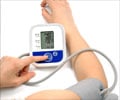- Hypertension in India: a systematic review and meta-analysis of prevalence, awareness, and control of hypertension - (http://www.ncbi.nlm.nih.gov/pmc/articles/pmc4011565/)
- Hypertension in India - (http://www.cadiresearch.org/topic/hypertension/hypertension-india)
- How to lower your blood pressure - (http://www.bloodpressureuk.org/bloodpressureandyou/thebasics/yourlifestyle)
- Managing Stress to Control High Blood Pressure - (http://www.heart.org/heartorg/conditions/highbloodpressure/preventiontreatmentofhighbloodpressure/stress-and-blood-pressure_ucm_301883_article.jsp#.vxcm_ex97iv)
- High blood pressure (hypertension) - (http://www.nhs.uk/conditions/blood-pressure-(high)/pages/prevention.aspx)
Simple Ways to Lower Your Blood Pressure Naturally
Hypertension is a chronic condition that is prevalent across the world. It increases the risk for
- Heart attack
- Aneurysm
- Stroke
- Kidney failure
- Decline in cognitive abilities
In the United States, 15% of deaths are caused due to elevated blood pressure while 28% of the population are unaware of their high blood pressure.
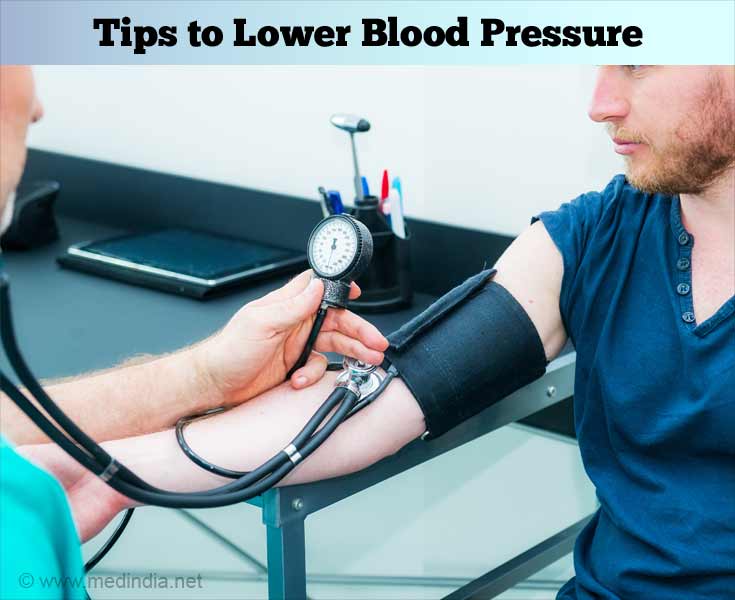
In India, 20- 40% of adults in the urban region and 12-17% of adults in the rural region have high blood pressure. The number of adults with high blood pressure in 2000 was 118 million, which is set to rise to 214 million in 2025.
Hypertension is largely caused by the lifestyle being led and it can be reversed to a large extent by altering your lifestyle and choosing a more holistic option. Here are 10 simple ways that can lower your blood pressure without the need for medication.
1. Watch Your Weight
Piling on weight adds stress to the body and leads to an increase in blood pressure. Be conscious about gaining weight and focus on maintaining a healthy weight.
Losing about 5 kilograms results in an improvement in blood pressure. Your lifestyle should be tailored around managing your weight within a healthy range, to reduce the stress to the heart and to maintain your blood pressure.
Apart from the actual weight, the area of fat accumulation also plays a key role in maintaining a healthy blood pressure. The size of the waist is a key indicator of elevated levels of blood pressure.
Maintaining a BMI between 18.5 – 24.9 is an indicator of healthy weight. Being overweight can pose a risk of developing various conditions like heart disease, joint conditions, type 2 diabetes.
Obesity also causes sleep apnea, which disrupts sleep and adds to stress which in turn leads to a raise in blood pressure.
Recommended Limits for Waist Measurement:
- Men - Waist measurement should not be more than 40 inches
- Women - Waist measurement should not be more than 35 inches

2. Walk Briskly Every Day For 30 Minutes
Walking is a great form of exercise as it is simple, does not need any special equipment, unless of course you decide to use a treadmill. Brisk walking every day for 30 minutes aids in weight loss and also improves blood circulation.
The higher amounts of oxygen that are taken up during a good workout or after a brisk walk improves the rate at which blood is pumped. It also releases oxytocin which can leave you feeling happy.
Apart from brisk walking other exercises such as jogging, cycling, swimming, dancing and strength training can aid in maintaining an optimum level of blood pressure.
3. Eat The Dash (Dietary Approach to Stop Hypertension) Diet
The DASH diet consists of
- Low-fat dairy products
- Whole grains
- Fruits
- Vegetables
- Low amounts of saturated fats
Eating a well-balanced diet that is low in saturated fat reduces the risk for fat deposition in the arteries that increase the risk for elevated blood pressure. Following a closely monitored DASH diet, by reading the labels of store-bought food will reduce blood pressure by up to 14 mm HG.
Initially, it might be difficult to change dietary patterns but over time, the benefits obtained from following this diet will encourage adhering to this diet enthusiastically.
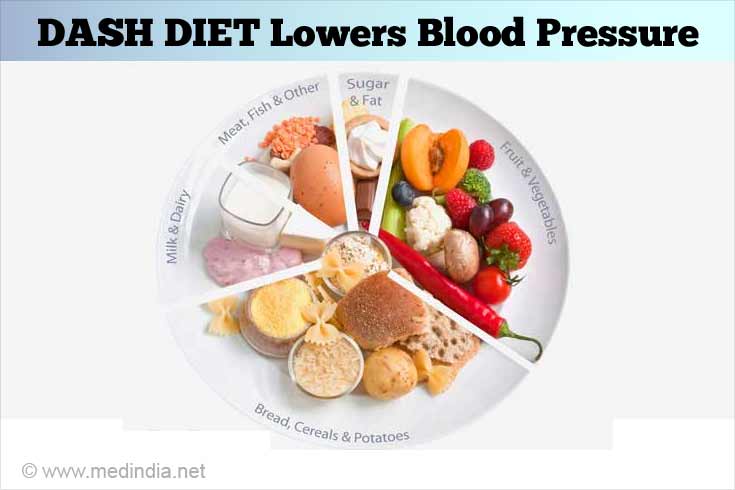
4. The Paradox of Drinking Alcohol
While drinking a small amount of alcohol has found to lower blood pressure by 2–4 mm Hg, excessive amounts can lead to skyrocketing blood pressure levels.
High intake of alcohol not only increases blood pressure but also prevents blood pressure medications from working. This is a double edged sword, where the protection offered by blood pressure medications are negated while there is also a spike in blood pressure. A situation that people with blood pressure should actively avoid. Daily intake of alcohol increases the risk of breast cancer in women apart from an increase in blood pressure levels.
Recommended Limits for Alcohol Consumption:
- Women- One drink/day
- Men under 65 years of age- One drink/day
- Men over 65 years of age- 2 drinks/day
5. Cut Down on Salt Intake
A high salt intake elevates blood pressure in the body. Some people are more prone to the level of salt consumed, like people who have already been diagnosed with blood pressure or the elderly, when compared to others but since it is difficult to find out, it is better to limit the quantity of salt consumed.
Recommended Level of Salt:
- 1500mg /day
Most people far exceed this limit but here are some ways that salt can be lowered in our diet:
- Packaged Food: Salt acts as a preservative in packaged food so there are higher levels of salt in canned soups, packaged mixes and meat. Do not consume packaged food and this will lower intake of salt.
- Carefully Monitor the Amount of Salt Added to Meals: Lower the amount of salt added to meals and adapt to the change in taste as it might seem different at the beginning, but it will soon taste just as good. After a while, higher salt level in food could prove to be difficult to enjoy. Opt for other spices that add flavor instead of high salt.
- Stop Placing Salt on the Table: Placing a salt shaker on the table will coerce you into adding a little extra to the soup your relish. This can add to the blood pressure risk. Instead, keep it away from immediate sight.
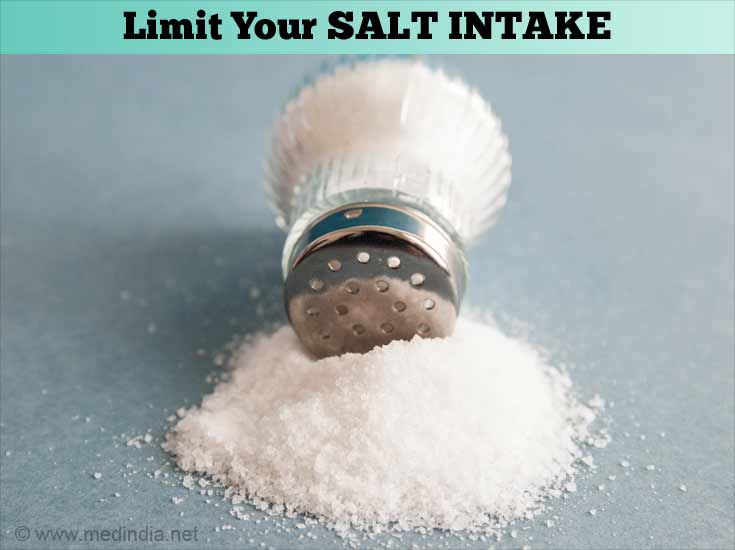
6. Increase Intake of Potassium
Potassium aids in lowering blood pressure and is considered a heart healthy mineral. It aids in
- Heart muscle contraction
- Prevents strokes
- Lowers blood pressure
The mechanism in which potassium aids in lowering blood pressure is that potassium helps in maintaining the kidney function when sodium levels are high(this causes high blood pressure and retention of fluid in the body) to eliminate excess fluid in the body and therefore avoids elevation of blood pressure values.
Potassium is found in bananas, avocados, tomatoes, raisins, figs, green vegetables, lentils, orange fruits and vegetables, mushrooms and beans. It is best to get your daily potassium from natural sources.
Recommended Level of Potassium:
- 4,700 mg of potassium per day
7. Stop smoking
Smoking causes a lot of ill effects to health and should be avoided. There is an increase in blood pressure that is witnessed among people who smoke and the effect lasts long after the individual has finished smoking. People who quit smoking enjoy better health within a few months.
Smoking damages arteries and thereby increases the risk of hypertension, coronary artery disease and stroke. Second-hand smoke is also dangerous as it increases the risk of developing heart disease by 25-30 percent.
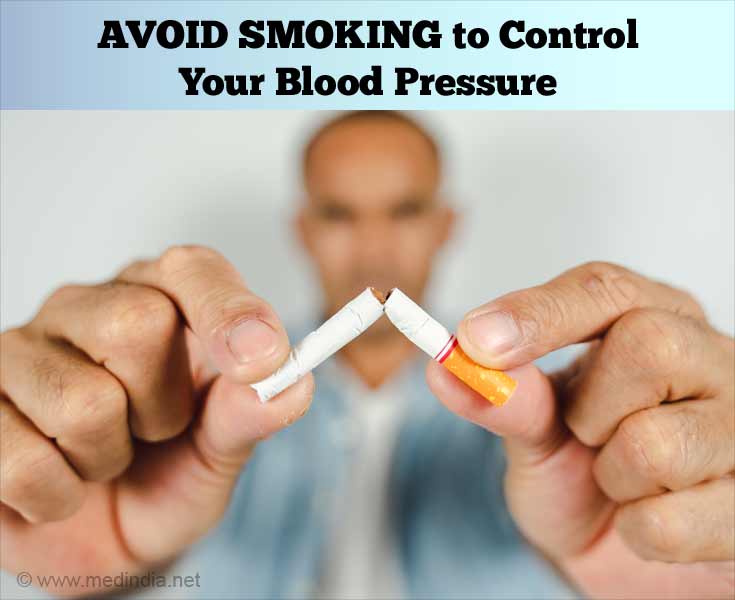
8. Lower Stress
Stress is a prime contributor to elevated blood pressure. People who suffer from chronic stress are at a higher risk for high blood pressure.
Managing stress effectively will aid in lowering BP. Here are some ways to lower stress:
- Identify the Source of Stress: Find out what gets you worked up and find ways to resolve the issue. If you can’t resolve it then actively ignore it or condition yourself to become resilient.
- Exercise: Exercise is not only good for lowering your weight but can also lower stress levels due to the release of the hormone called oxytocin.
- Practice Meditation: Sit with your back straight and focus on your breathing for 10 minutes every day, this is a great stress buster and can work to calm your nerves.
- Spend Time for Yourself and in Nurturing Relationships: Indulge in a hobby that you like as joining a support group, go for a swim or ride a bike, get a relaxing massage or take a good nap.
- Improve Your Time-Management Skills: Juggling between family, kids and work efficiently lowers stress levels and does not trigger your blood pressure levels.
9. Control Intake of Coffee
Drinking coffee can lead to tightening of blood vessels which increase blood pressure. 500mg of coffee increases blood pressure by 4mm Hg and this effect can even last until late evening or night. Consider cutting down on coffee to avoid raise in blood pressure levels.

10. Eat Dark Chocolate
Studies have shown that eating dark chocolate, that contains at least 70% cocoa, lowers blood pressure. It also contains flavonoids that aid in making blood vessels a lot more elastic, which in turn improves blood flow. Flavonoids are notably abundant in the cocoa solids of the cocoa bean hence are beneficial in preventing spikes in blood pressure and also various conditions like type 2 diabetes, heart diseases and high cholesterol levels. According to such studies, eating half an ounce of dark chocolate can lower blood pressure.
Blood pressure can be effectively controlled by adopting these lifestyle measures, apart from a host of other health benefits that these changes will provide.

